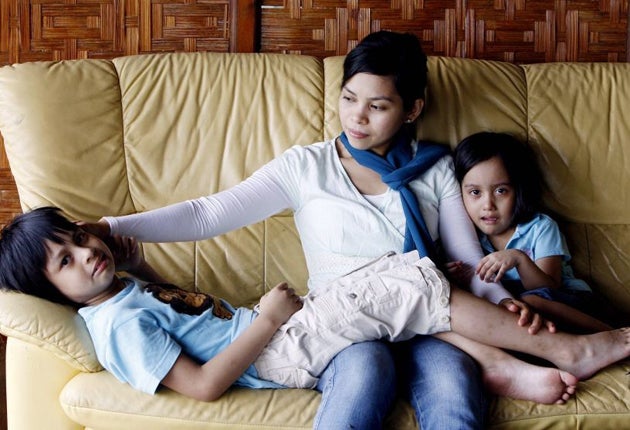'If you're going to cane me, then do it in public'
Model's stand after conviction for drinking alcohol exposes brutality of Malaysian law

She says it was only the second time she had drunk alcohol in her life, and even then it was just a few of glasses of beer. But it was enough for a Muslim court in Malaysia to order Kartika Sari Dewi Shukarno, a part-time model and mother-of-two, to be caned. The corporal punishment case has divided the Asian nation and led human rights campaigners to urge the authorities to show restraint.
Now, in her first interview, Ms Kartika has urged the authorities to carry out the punishment in public. "I never cried when I was sentenced by the judge," she told Reuters at her father's house in a village 200 miles north of Kuala Lumpur. "I told myself, all right then, let's get on with it."
Ms Kartika, who would be the first woman to be caned in the Muslim-majority country, is actually a citizen of neighbouring Singapore, and does not even live in Malaysia. But last year she was caught drinking at a hotel in Kuantan in the eastern Malaysian state of Pahang during a police raid. Under Malaysian law, while it is legal for non-Muslims to drink alcohol, Muslims – even foreigners – may not.
Last month, a sharia court that operates in parallel with the country's normal judicial system and is available for trying so-called "religious crimes" ordered that she pay a 5,000 ringgit fine (£860) and be caned six times, after she pleaded guilty to drinking three glasses of beer.
Ms Kartika, who also works in a hospital, had the opportunity to appeal against the sentence but decided not to. Now both she and her father have raised the stakes by demanding that the punishment be done in public, in order to deter other Muslims who might be tempted to drink alcohol in the country. Whether this might constitute some sort of brinkmanship designed to call the bluff of the authorities is unclear. But the 32-year-old insisted that the 20-month ordeal had ruined her life and forced her to resign from her position with the hospital.
Since then she has only worked as a part-time model. "I only declared I was a model to protect my full-time job," she said. "I felt very humiliated because people used my status as a part-time model to publicise my case."
Her father, Shukarno Abdul Muttalib, has also suggested that the caning should take place in public. "As a Muslim, I agree with her punishment, but I don't agree that it should be done in jail, she is not a prisoner," he told Bloomberg News. "If the authorities want to use this as an example, then the caning should be done in public."
On Monday Ms Kartika is due to be taken to a prison in central Selangor state for seven days. At some point during that time, the punishment will be carried out. According to the regulations, she will be fully clothed at the time of caning and kneeling down. Officials have said she will be struck on the backside using a small thin cane and only with moderate force. They insist it is not intended to hurt her.
An unidentified "whipping officer" told local journalists: "Sharia whipping is more like caning naughty schoolboys. In sharia the punishment is not in the force of the whipping but to bring shame. The whipping implement is supposed to be soft and supple, so as to inflict the least pain."
But campaigners say that whether Ms Kartika suffers pain during the ordeal or not is beside the point. Amnesty International and other campaigners have urged the courts to drop the sentence, saying it was "cruel, inhuman and degrading punishment and prohibited under international human rights law". Amnesty said that at least 34,923 migrants, mainly from South-east Asian countries, were caned in Malaysia between 2002 and 2008 for immigration offences. "They have been doing it with some gusto," Amnesty's Asia director, Sam Zarisi, commented. "Usually these sentences are carried out on migrants. This is the first time a woman will have been caned, and the first time someone will have been caned under sharia law. It's an unfortunate direction."
In Malaysia, opinions are divided about the punishment Ms Kartika faces. "Nobody should have to endure corporal punishment," said Ragunath Kesavan, president of the Malaysian Bar Council. He said a public caning would be unacceptable to many and would set an unwelcome precedent.
Join our commenting forum
Join thought-provoking conversations, follow other Independent readers and see their replies
Comments